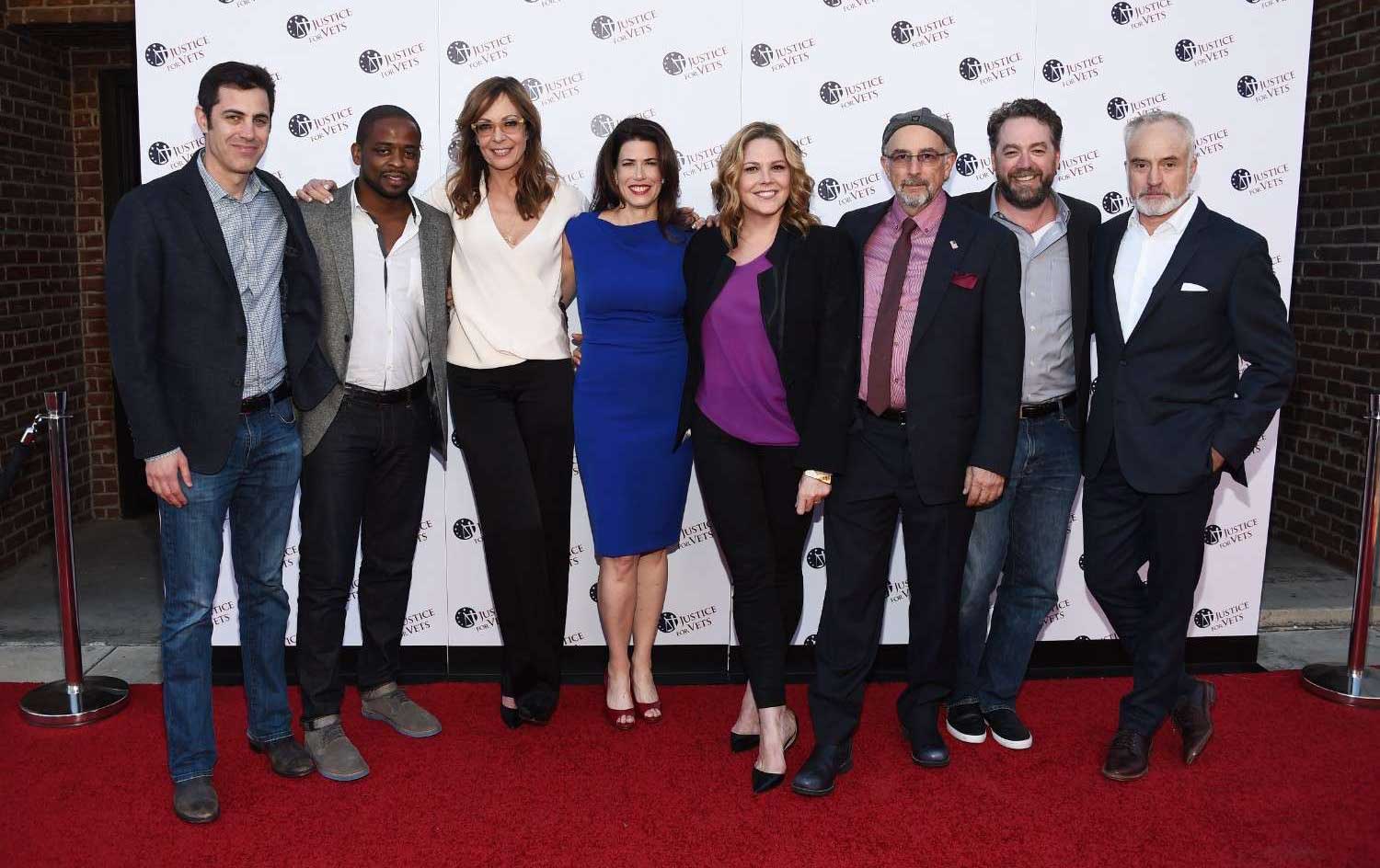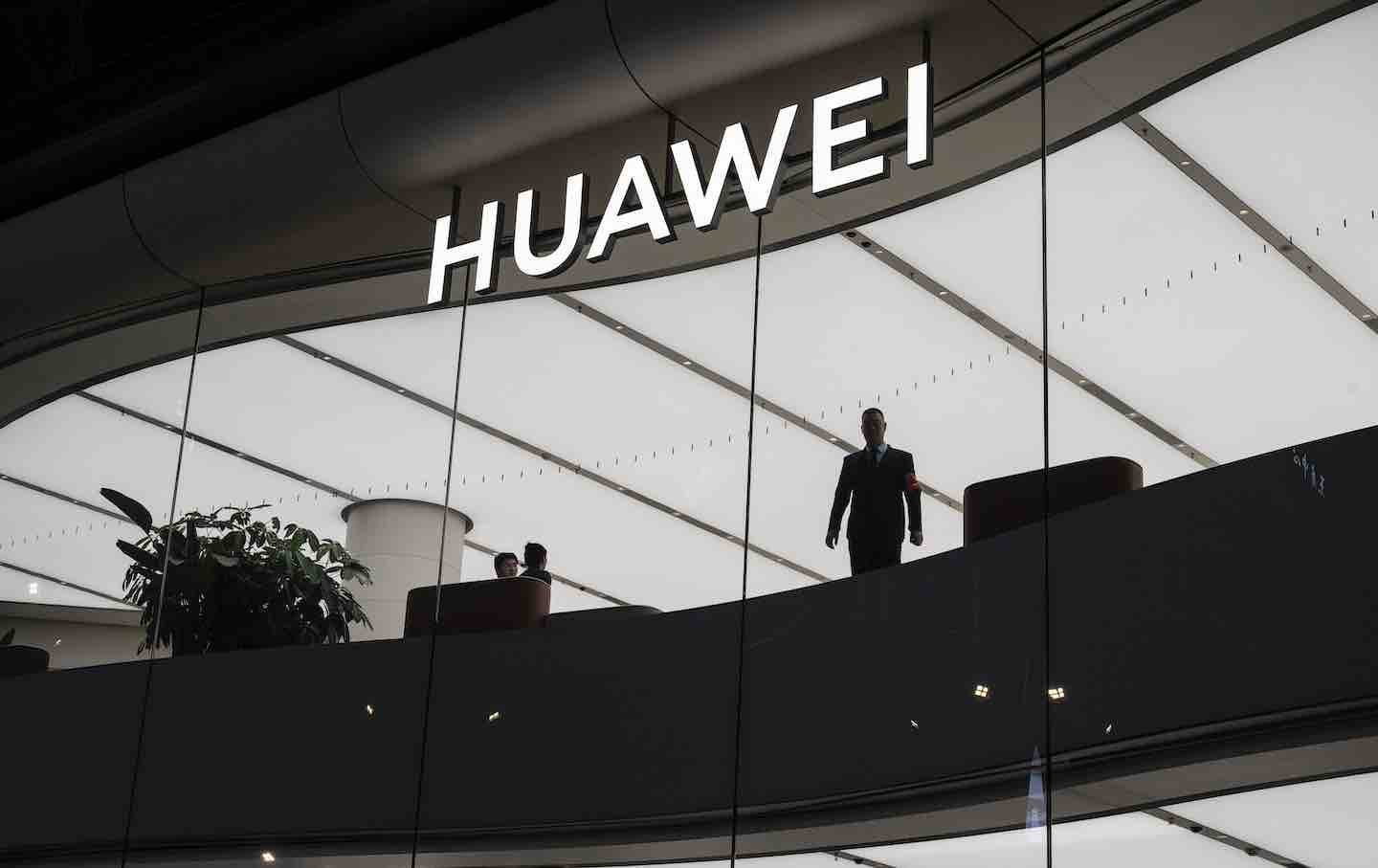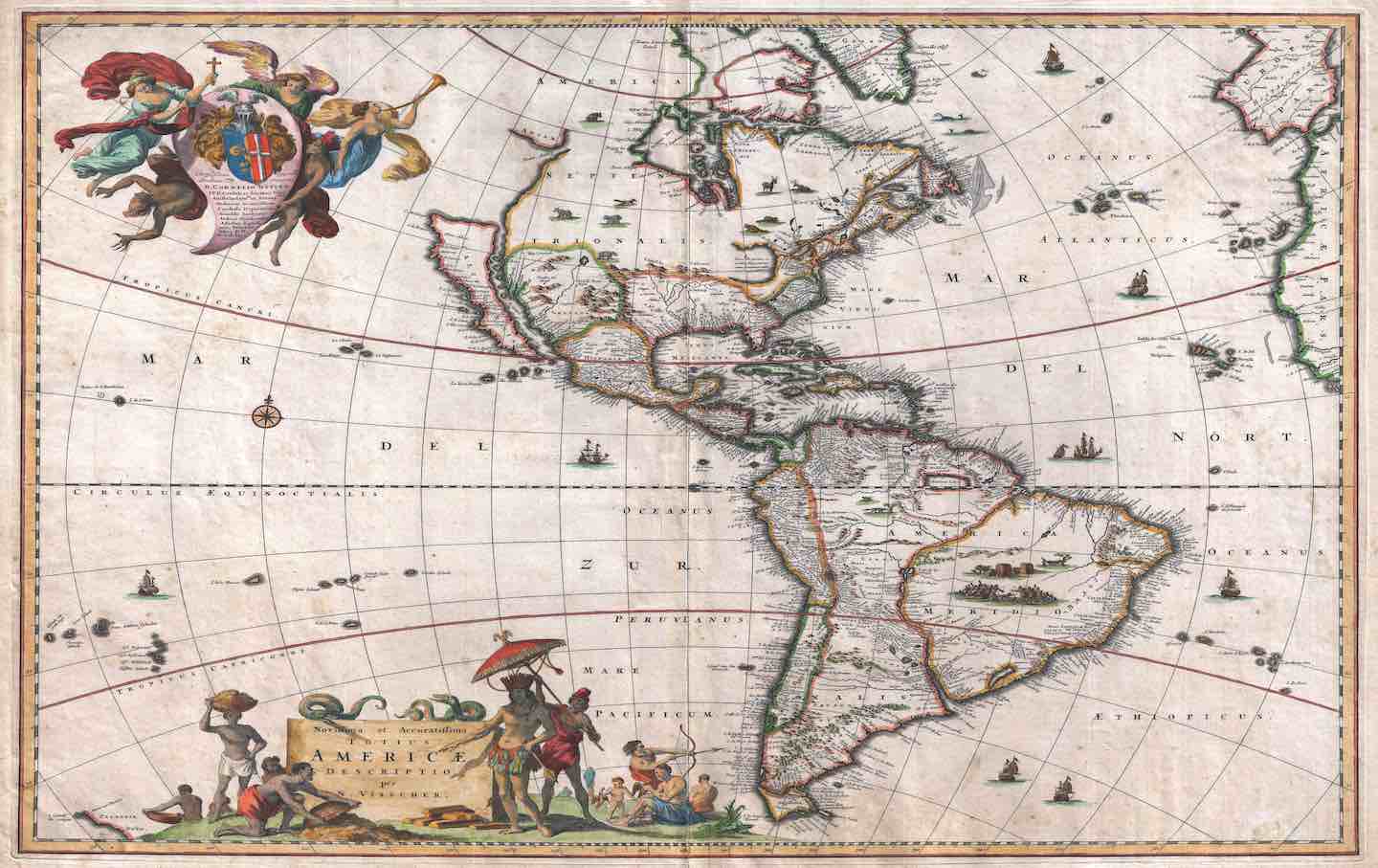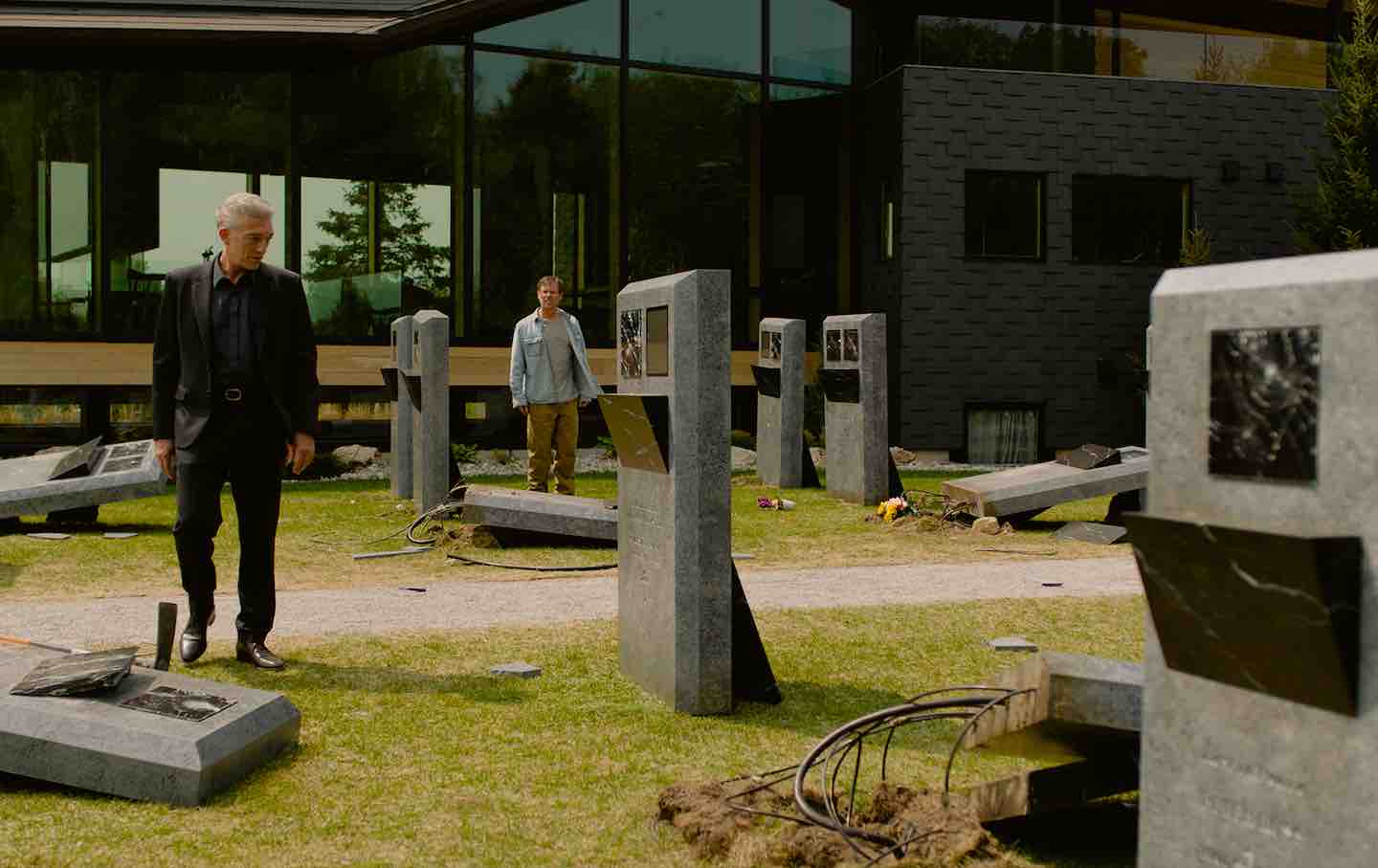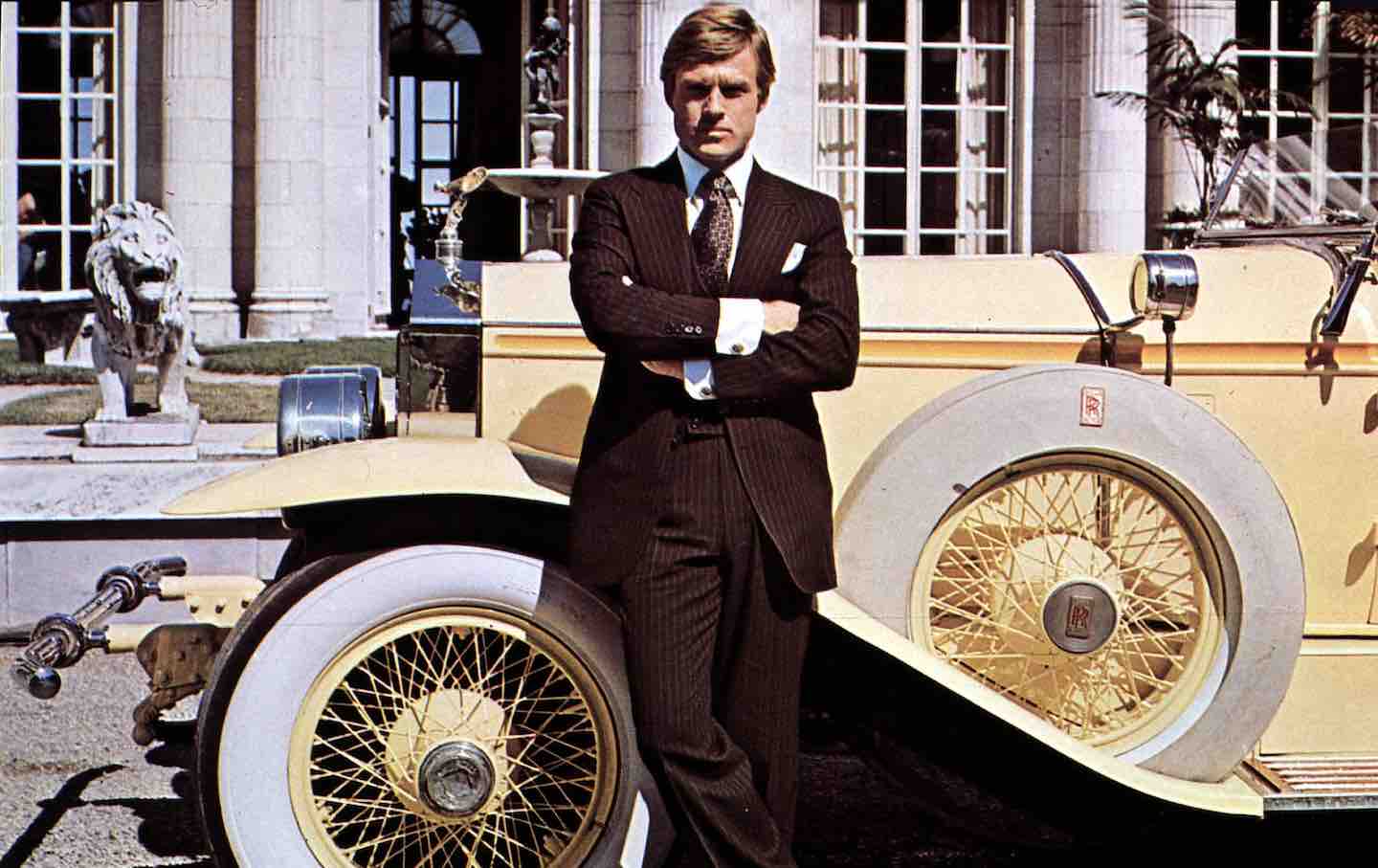The Apprenticeship of Donald Trump
A new film examines Trump’s formative years under the tutelage of Roy Cohn.
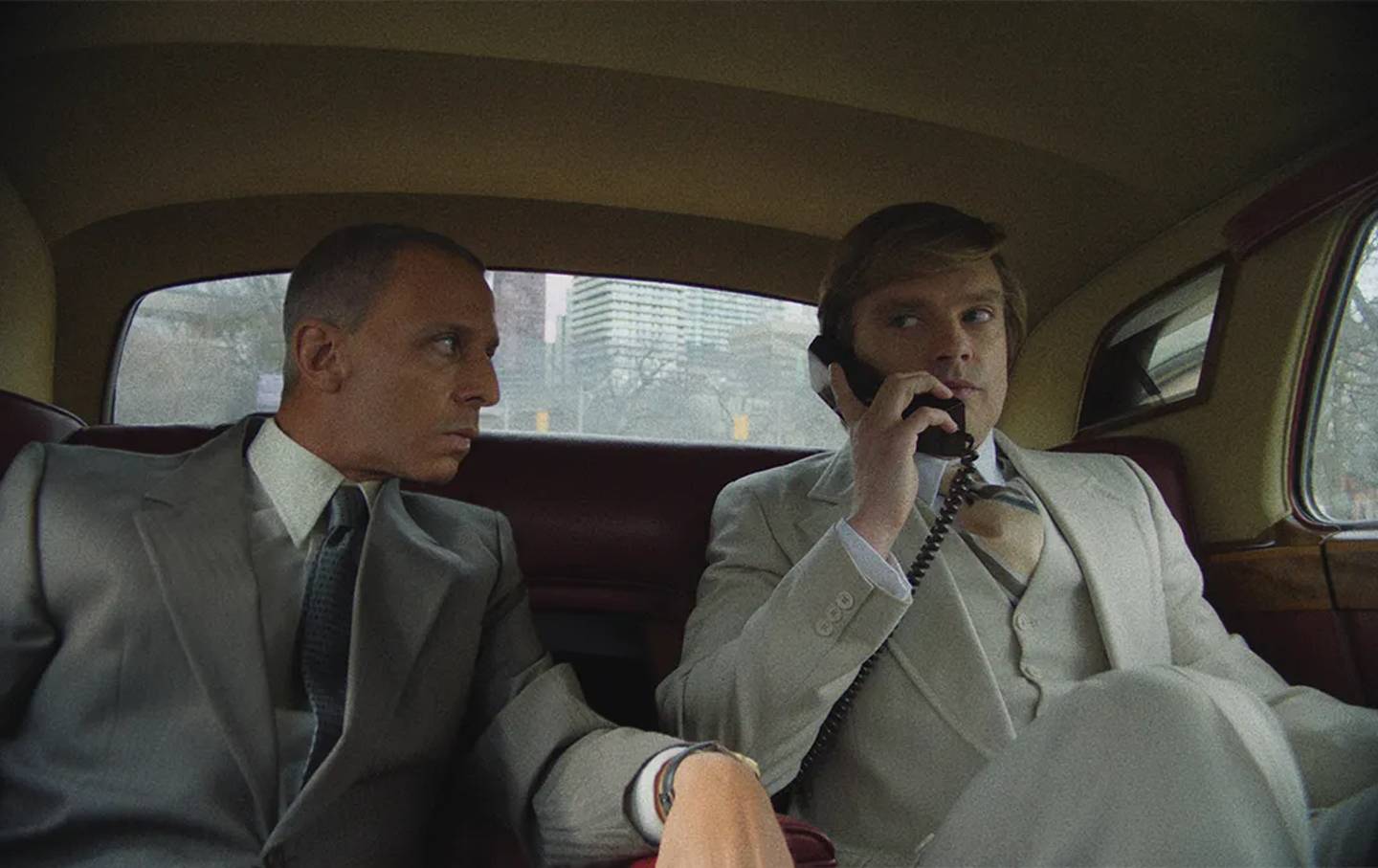
A scene from The Apprentice.
There’s an old segment of The Today Show that circulates periodically online—maybe you’ve seen it. It’s 1980, and Donald Trump, then 33, is being interviewed by a 40-year-old Tom Brokaw. They’re discussing Trump’s burgeoning skyscraper portfolio in Midtown Manhattan, but the reason the clip retains such fascination has less to do with the subject matter than with Trump’s delivery. Anyone who watches it comes away struck by how much more articulate and focused the 45th president once was. The Queens accent is recognizable, and there’s a certain familiar bluster, but instead of the rambling, free-associative conspiratorial diatribes we’ve come to expect, what we see is a young man on the make who is confident, lucid, and seemingly well-informed about the workings of the real estate market.
Though already a nationally known figure by that point, in the popular imagination the Trump of 1980 has been largely lost to the Trump who has dominated global attention for the better part of a decade. It’s the latter Trump we often see impersonated, whether by Alec Baldwin or James Austin Johnson on Saturday Night Live, by Brendan Gleeson in The Comey Rule, or, more loosely, by Nick Offerman in Civil War. Regardless of the specific merits of each of those performances, they all come off as a little redundant. The real Trump is himself a performer, having portrayed a larger-than-life character named Donald Trump on NBC’s reality series The Apprentice, in political debates and rallies, and eventually in the Oval Office—and no one plays Trump like Trump.
Ali Abbasi’s new film, also titled The Apprentice, is the first attempt to turn back the clock and portray that earlier Trump—the Trump that Trump no longer plays. In the title role, Sebastian Stan tries to present him as almost a normal human being, albeit one who is clearly on a journey somewhere weirder. Following the future president between 1973 and 1986, The Apprentice charts a formative period in Trump’s life that begins with his fateful encounter with Roy Cohn (Jeremy Strong) and ends with Cohn’s death from what he always insisted was liver cancer, but which is widely understood to have been AIDS. During much of this period, the film suggests, Trump himself was the apprentice of Cohn, who trained him in the dark arts of seeking and wielding power and, in doing so, created a monster.
A film about a current presidential candidate with even odds of winning was always going to be controversial—especially one that depicts said candidate raping his then-wife Ivana (Maria Bakalova) on-screen, an act the real Ivana alleged in divorce papers occurred before recanting years later. (Ivana died in 2022 and thus can’t comment on the film.) The Apprentice has weathered legal threats and distributional obstacles from Trump’s allies, and the former president himself has called it “a cheap, defamatory, and politically disgusting hatchet job.” But even liberal critics and audiences seem polarized. While The Apprentice has received generally positive reviews and a standing ovation at Cannes, its opening-weekend box office returns were disappointing, and some viewers seemed uneasy with the whole premise. On Letterboxd, the legendary screenwriter and director Paul Schrader called it an excellent film that “requires you to spend 2hr15min in the company of a shallow reprehensible person,” adding that he left in disgust after an hour and a half.
Schrader is not alone. I have friends who can imagine watching the film only if and after Trump loses. For many Americans, the constant media coverage of the real Trump is exhausting enough that the entertainment value of a simulacrum seems dubious, regardless of how well it’s executed. It’s too depressing a topic to think about in the meantime.
That’s a pity, because while much of what The Apprentice depicts is disturbing, none of us are free to opt out of the embarrassing reality that Donald Trump is a major historical figure who was elected president once and might be again in a few weeks. The film is indeed well-executed, and Abbasi and screenwriter Gabriel Sherman, a veteran journalist, deserve credit for effectively capturing a younger and less seasoned Trump absorbing Cohn’s methods in all their unseemliness. Stan and Strong are utterly persuasive at humanizing two figures who themselves have worked so hard to come across as caricatures. In doing so, they give us a fresh perspective on our political moment that we can’t afford to ignore.
When we first meet Trump in The Apprentice, he’s simply the son of Fred Trump (Martin Donovan), a tyrannical father and outer-borough real estate developer with no particular clout in Manhattan. Fred openly berates his older son, Freddy (Charlie Carrick), a commercial airline pilot and heavy drinker; Donald, at least, is a teetotaler and has entered the family business, where he has big plans, even though he still has to do the unglamorous work of door-to-door rent collection.
The father-son relationship is one of the more compelling aspects of the film; even knowing the basic facts, I came away newly struck by Fred’s abusive mastery of his petty Queens empire and by Donald’s almost admirable determination to compete in a bigger pond. Though very little about The Apprentice flatters the future president, he is depicted as having gotten one big thing right: He understood in the 1970s, at perhaps the lowest point in Manhattan’s history, that there was a fortune to be made in redeveloping the seedy area around Grand Central Terminal as a luxury destination. This took some legitimate vision and guts to propose, along with an almost romantic belief in the resilience of New York; to actually realize it required something else.
Trump’s meal ticket turns out to be the tabloid-friendly lawyer Roy Cohn, by this point already notorious for his role in delivering Julius and Ethel Rosenberg to the electric chair, among other infamies. Cohn, whose portrayal by Strong has been deemed “uncanny” by none other than former Cohn associate Roger Stone (who is portrayed in the film by Mark Rendall), introduces himself at an elite private club to which Trump has been newly inducted. He is tough, impervious, a fount of one-liners and putdowns, and surrounded by mafiosi and younger male lovers who treat him as the ultimate VIP.
Stan’s Trump is a different kind of creature. He is awkward, unassuming, a bit shy, and at the same time hungry for the older man’s approval. “I don’t drink,” Trump tells Cohn when offered a glass of Smirnoff neat, to which Cohn replies that he does if he wants to do business. Trump ends up vomiting twice, but he gets what he was after: Cohn agrees to represent the Trump Organization in its struggle against the Department of Justice, which is suing over the elder Trump’s unsubtle discrimination against Black tenants.
Besides beating the case by both legal and extralegal means—he files a countersuit and then blackmails the judge—Cohn takes Trump under his wing. He buys Trump a suit that’s “more Park Avenue than Flushing,” introduces him to people like Andy Warhol and Rupert Murdoch, and initiates him into the hedonistic nightlife of New York’s decadent elite. Cohn is eager to mold his young protégé into a VIP in his own right; he sees Trump as both an unrequited romantic conquest and as yet another power player in his debt. (Trump, meanwhile, sees Cohn as a better father than his actual father.) To that end, Cohn gives Trump his most valuable asset, his crisis playbook: always go on the attack, never admit defeat, and win no matter what.
Cohn’s tutelage quickly pays off: Trump is able to capitalize on the desperation of a city whose finances are in free fall. Sherman’s script reflects the fiscal crisis detailed in Kim Phillips-Fein’s Fear City, in which financiers hijacked the city government and imposed brutal austerity measures after President Gerald Ford told the nearly bankrupt city to (in the words of a famous Daily News headline) “drop dead.” Cohn’s corrupt methods and extensive Rolodex play a large part in Trump’s success: He helps Trump secure the tax breaks he needs to redevelop whole blocks of Midtown on the backs of the city’s working poor, as well as the puffy interviews that turn Trump into a national celebrity.
Popular
“swipe left below to view more authors”Swipe →The newly emboldened Trump begins pursuing Ivana Zelníčková, the Czech American fashion model he first encounters while she’s trying to get into the same club where he first met Cohn. It’s an aggressive courtship in which he pursues her all the way to Aspen; Ivana, as we learn, has her own grand business ambitions and won’t be satisfied as a mere trophy wife. At first that appeals to Trump, but we know this is not a man who is ultimately going to be comfortable in an equal partnership with a woman.
So far, we have been tracking Trump’s rise from the outer boroughs to the heights of power, filmed in a grainy style that re-creates the bleak cinematic landscape of 1970s New York familiar from movies like Taxi Driver and The French Connection. But as the story advances into the Reagan era, the colors get bolder, and our protagonist begins to resemble the paradigmatic drug-addled capitalists of the age.
Powered by a growing amphetamine habit, Stan’s Trump becomes more reckless and more determined to squander his good fortune on ill-conceived investments in Atlantic City. He also begins to resemble the father he once rebelled against: He is cruel and abusive to Ivana and seeks gratification elsewhere. He turns his back on his brother, who is spiraling into addiction. As Trump’s ego and fame grow, we watch Cohn physically wither from his illness, which Trump himself finds repulsive. If the first half of the film feels like a wild night out, the second half is the next morning’s dismal hangover.
It’s no wonder that The Apprentice has been greeted with such indifference: We know how this story ends, and by and large we wish we didn’t. The New York of the 1970s, with its open-air drug and sex markets and fast-disintegrating public sector, feels distant enough for nostalgia; the New York of the ’80s, practically personified by Trump’s excesses, feels entirely too familiar. There is guilty pleasure to be found in a comfortably malevolent Cohn tutoring an unformed Trump, but there’s limited pathos in watching the pupil reject the master—dying of AIDS and being treated with open disgust doesn’t make Cohn retroactively sympathetic. By the final act, this is not an easy film to watch.
All the same, The Apprentice deserves a warmer reception than it’s gotten, and perhaps when enough time has passed from this ugly historical moment, it will warrant a second look. The filmmakers, and especially the cast, have managed to take seriously a fundamentally unserious man and to draw a portrait that is all the more unsettling for being fair-minded. However this election turns out, we are stuck with Donald Trump and with the society that created him, shaped him, and repeatedly embraced him. We are not better than this.
Hold the powerful to account by supporting The Nation
The chaos and cruelty of the Trump administration reaches new lows each week.
Trump’s catastrophic “Liberation Day” has wreaked havoc on the world economy and set up yet another constitutional crisis at home. Plainclothes officers continue to abduct university students off the streets. So-called “enemy aliens” are flown abroad to a mega prison against the orders of the courts. And Signalgate promises to be the first of many incompetence scandals that expose the brutal violence at the core of the American empire.
At a time when elite universities, powerful law firms, and influential media outlets are capitulating to Trump’s intimidation, The Nation is more determined than ever before to hold the powerful to account.
In just the last month, we’ve published reporting on how Trump outsources his mass deportation agenda to other countries, exposed the administration’s appeal to obscure laws to carry out its repressive agenda, and amplified the voices of brave student activists targeted by universities.
We also continue to tell the stories of those who fight back against Trump and Musk, whether on the streets in growing protest movements, in town halls across the country, or in critical state elections—like Wisconsin’s recent state Supreme Court race—that provide a model for resisting Trumpism and prove that Musk can’t buy our democracy.
This is the journalism that matters in 2025. But we can’t do this without you. As a reader-supported publication, we rely on the support of generous donors. Please, help make our essential independent journalism possible with a donation today.
In solidarity,
The Editors
The Nation


